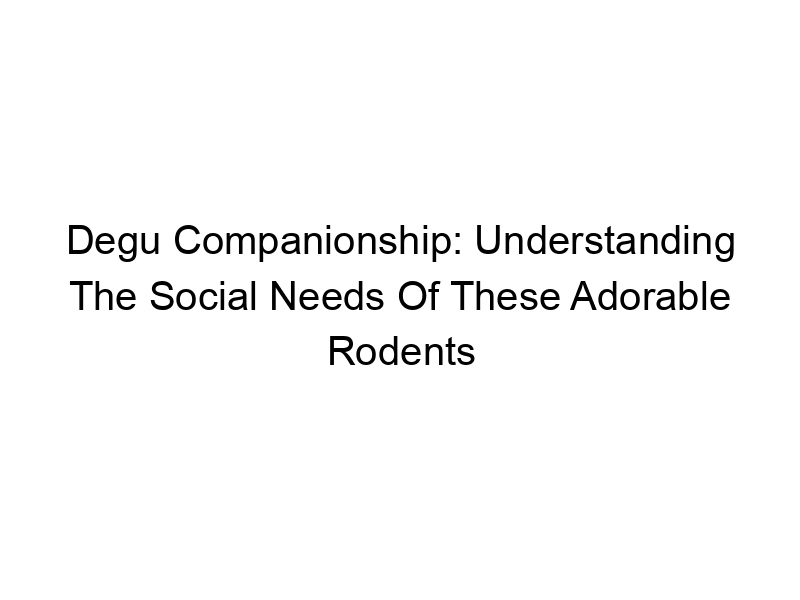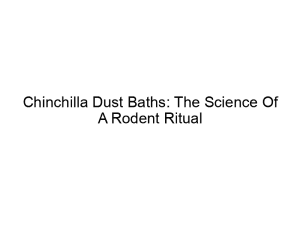Degus are incredibly social creatures, and understanding their social needs is crucial for their well-being. Degu Socialization: Why These Rodents Need a Friend isn’t just about companionship; it’s about their physical and mental health. This in-depth guide will explore the importance of degu socialization, covering everything from the basics of their social structure to advanced techniques for successful integration. We’ll delve into the potential problems of loneliness, explore the ideal setup for multiple degus, and answer your frequently asked questions. By the end, you’ll be confident in providing your degu(s) with the fulfilling social life they deserve.
Degus are highly social animals, thriving in groups and exhibiting complex social behaviors. Unlike solitary rodents, degus live in colonies in the wild, constantly interacting with their kin. These interactions are vital
for their emotional well-being and even impact their physical health. Solitary confinement can lead to stress, depression, and even premature death.
Degu Communication: More Than Just Squeaks
Degus communicate through a variety of vocalizations, body language, and scent marking. Understanding these communication methods is key to interpreting their behavior and ensuring a harmonious environment. Squeaks, chirps, and chattering indicate different emotional states – happiness, alarm, or distress. Proper socialization helps them learn to interpret these signals effectively within their group.
The Dangers of Solitary Confinement for Degus
Physical Health Implications of Isolation
Studies show that isolated degus are more prone to various health issues, including weight loss, decreased activity levels, and weakened immune systems. The stress of loneliness negatively affects their hormone balance, making them more vulnerable to illness. This highlights the importance of providing them with appropriate social interaction.
Behavioral Problems Arising from Loneliness
A lonely degu might display abnormal behaviors such as excessive chewing, repetitive pacing, or self-mutilation. These are clear signs of distress and indicate a desperate need for companionship. Early intervention is crucial to prevent these behaviors from becoming ingrained.
Selecting Suitable Degu Companions
Pairing Same-Sex Degus: Avoiding Breeding Issues
Unless you are a responsible breeder, it’s generally recommended to house same-sex degus together. Introducing opposite-sex degus without proper planning can quickly lead to unwanted pregnancies and complicate management. Carefully consider your preparedness before allowing breeding.
Age and Temperament Considerations
Ideally, introduce young degus together, as they are more adaptable to new companions. Introducing an adult degu to a group already established can be challenging. Observe their personalities; similar temperaments generally lead to better integration.
Introducing New Degus to an Existing Group
The Gradual Introduction Method
Introduce new degus gradually. Initially, keep them in separate cages with scent swapping. This helps them get used to each other’s smell before a direct encounter. Gradually increase interaction opportunities, always under close supervision.
Neutral Territory and Monitoring Interactions
Use a neutral space for the initial introductions. This prevents territorial disputes. Monitor their interactions closely, looking for signs of aggression or dominance. Be prepared to separate them if necessary and continue the gradual introduction process.
Creating an Ideal Degu Environment for Multiple Animals
Space Requirements for Multiple Degus
More degus require more space. A larger cage is essential to avoid territorial conflicts and allow each degu sufficient room to explore, play, and have personal space. Consider multiple levels, tunnels, and hiding places to minimize competition.
Enrichment and Activities to Prevent Boredom
Provide a stimulating environment with a variety of toys, chewable items, and foraging opportunities. Boredom can contribute to aggression between degus. Regularly rotate their toys to keep things interesting and maintain engagement.
Addressing Common Socialization Challenges
Dealing with Bullying and Aggression
Aggressive behavior can be a significant challenge. Close observation is crucial to identify the instigator. Careful separation, environmental changes, and in some cases, professional veterinary guidance might be needed.
Resolving Hierarchy and Dominance Issues
Dominance hierarchies are natural in degu groups, but excessive aggression needs intervention. Ensure adequate resources are available to minimize competition. Sufficient space and enrichment items can help alleviate stress and reduce conflict.
Long-Term Degu Socialization: Maintaining Harmony
Ongoing Observation and Adjustments
Continuous observation is critical. Even after successful integration, monitor their behavior for any changes that might signal developing problems. Make necessary adjustments to the environment or routine as needed.
Signs of a Happy and Social Degu Colony
A happy degu colony displays friendly interactions, mutual grooming, and shared activities. Degus should appear relaxed, playful, and have healthy body conditions. Early intervention prevents small problems from escalating.
The Role of Diet and Health in Social Dynamics
Nutritional Factors Affecting Degu Behavior
A balanced diet plays a crucial role in a degu’s overall health and behavior. Nutritional deficiencies can lead to increased stress and irritability, potentially worsening social dynamics. Consult a veterinarian or a knowledgeable breeder for a proper diet plan.
Preventing and Managing Degu Diseases
Regular veterinary checkups are essential to detect and address any health issues promptly. Underlying health problems can manifest as behavioral changes. Healthy degus tend to be more relaxed and sociable.
Comparing Degu Socialization to Other Rodents
Degus vs. Hamsters: A Tale of Two Social Structures
Unlike degus, hamsters are generally solitary creatures. Attempting to house multiple hamsters together often results in fights and injuries. This highlights the significant differences in social needs.
Degus vs. Guinea Pigs: Similarities and Differences
Guinea pigs are also social animals, but their social structures differ slightly from degus. While both benefit from companionship, the specific requirements for group size and integration methods may vary.
Advanced Degu Socialization Techniques
Scent Swapping and Introduction Methods
Advanced techniques utilize controlled scent exposure to gradually acclimate degus to each other’s presence. This involves transferring bedding or toys between cages before a physical introduction. Slow and steady wins the race!
Addressing Specific Social Problems: Case Studies
Specific cases may require tailored solutions. Understanding the root cause of aggression, such as resource competition, can inform effective interventions. Consider consulting a specialist for complex situations.
Frequently Asked Questions
What are the signs of a happy, social degu colony?
A happy colony shows mutual grooming, shared activities, relaxed posture, and playful interactions. Degus will happily coexist without frequent fights or displays of dominance. Any signs of aggression, stress, or isolation should be looked into.
How many degus should I have?
The minimum is two, but more than two can help prevent isolation if one gets injured or ill. Three to five is ideal for a larger cage. Larger groups need larger cages, enrichment, and careful management.
My degus are fighting; what should I do?
Immediate separation might be necessary. Assess the cage size, resources, and enrichment. More space and resources can help. Introduce a neutral scent, such as a new toy or bedding, to the separated degus to reintroduce them slowly and carefully later. If fighting continues, consider seeking veterinary advice.
Can I introduce an adult degu to a group of juveniles?
It’s more challenging, but possible with slow, controlled introductions. Juveniles are generally more adaptable but might be more easily dominated. Close supervision is crucial, and if aggression occurs, separation and a gradual reintroduction are necessary.
Can I house male and female degus together?
Only if you plan to breed them responsibly, and even then, careful monitoring is necessary. Unwanted litters are common and challenging to manage. Same-sex pairings avoid this risk.
What if one degu is constantly bullying another?
Identify the bully and the victim. Consider temporarily separating them to allow the victim to recover. Once calm, re-introduction should be slow and closely monitored. If the bullying persists, consult a vet or experienced degu keeper for guidance.
Final Thoughts
Providing your degus with appropriate socialization is not simply about keeping them company; it’s crucial for their physical and emotional well-being. Understanding their social behavior, creating a suitable environment, and taking proactive measures to address any challenges will ensure your degus live long, happy, and healthy lives. Remember, the investment in proper socialization will reap great rewards in the form of a thriving, harmonious degu colony. Don’t hesitate to seek advice from experienced breeders or veterinarians if you encounter any difficulties. Your degus will thank you for it!




